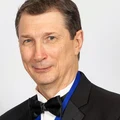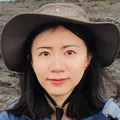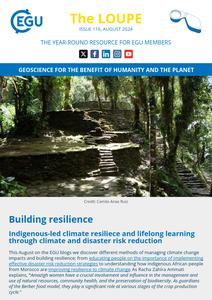President: Jeroen van Hunen
(Emailgd@egu.eu)
Deputy President: Laetitia Le Pourhiet
(Email)
ECS Representative: Garima Shukla
(Emailecs-gd@egu.eu)
Studies related to the Geodynamics Division include all aspects of geodynamic processes in the lithosphere, mantle, and core. They encompass different approaches, including observations, imaging, theory, modelling (numerical simulations and laboratory experiments), and interpretation. Examples include the dynamics of subduction, mid-ocean-ridge processes, vertical and horizontal plate movements driving mountain building and basin formation, lithosphere dynamics, mantle convection, and core dynamics.
Latest posts from the GD blog

Geekology #1: Matplotlib for geosciences, tips and tricks
This week inaugurates a new series of posts: Geekology, fusion of geek and geology. In this section, we will try to unravel tips and tricks of programming applied to geodynamics, from new innovative libraries to good programming practices, interviews with geologists who code and more! To kick off the series, this week’s article is written in collaboration with Baptiste Bordet, doctoral researcher at the Interdisciplinary Laboratory of Physics in Grenoble, France. In this post, we present a tutorial for the …
Read more

A journey to the centre of plate tectonics and mantle convection
“Dynamics of Plate Tectonics and Mantle Convection,” is edited by Dr. João C. Duarte and published by Elsevier. The book brings together contributions from more than 40 renowned authors in the fields of geology, geodynamics, tectonics, petrology and geophysics. It offers the unique authors’ perspective on the interconnected processes of plate tectonics and mantle convection and their views on fundamental questions about the forces driving plate’s motion, the supercontinent cycle, and the evolution of tectonics over Earth’s history, with some …
Read more

The Sassy Scientist – Conference Sprints
Just came back from holidays and found yourself staring at your calendar that’s full of conferences? I can almost hear the inner debate you’re having. Instead of keeping this internal dialogue to yourself, Reese decided to ask this question out loud: Should I go to every conference? Dear Reese, No. What are you? An olympic world record holder in breaking the space-time continuum? No, that’s what I thought. So hold your horses, sit down and evaluate where this FOMO (fear …
Read more

The nature of the shortening in the Central Andes : Part 1
In this new blog, Dr. Michael Pons, one of our editors-in-chief, introduce us to the geodynamic and tectonic context surrounding the formation of the Central Andes. His PhD work focussed on the different mechanisms playing a significant role in the formation of the mountain belt using advanced numerical modelling techniques. Mountains can form due to different processes, as so we can distinguish different types of mountain belts (Figure 1): the ones formed at divergent margins, such as in the middle …
Read more
Recent awardees

The 2024 Augustus Love Medal is awarded to
Taras Gerya for his novel approach in using computational geodynamics to address outstanding tectonic and geodynamic questions in a way that reaches out to petrologists, geochemists, and structural geologists.
Read more

- 2024
- Division Outstanding Early Career Scientist Award
The 2024 Division Outstanding Early Career Scientist Award is awarded to
Anne Glerum for her contributions in geodynamics, including providing new insight in the East African rift system, methodological advancement of geodynamic modelling techniques, and outstanding community service.
Read more

The 2023 Augustus Love Medal is awarded to
Thorsten W. Becker for outstanding research contributions in regional and global geodynamics, seismology, tectonics, and earthquake source processes, and for scientific leadership and selfless service.
Read more

- 2023
- Division Outstanding Early Career Scientist Award
The 2023 Division Outstanding Early Career Scientist Award is awarded to
Ágnes Király for her significant contributions in geodynamics, including contributions on viscous anisotropy in the mantle and new interactions between subduction and geological deformation and volcanism.
Read more

- 2023
- Outstanding Student and PhD candidate Presentation (OSPP) Award
The 2023 Outstanding Student and PhD candidate Presentation (OSPP) Award is awarded to
Philippa Slay Observed Dynamic Topography and Cenozoic Magmatism of the Eastern Seaboard of Australia
Read more

- 2023
- Outstanding Student and PhD candidate Presentation (OSPP) Award
The 2023 Outstanding Student and PhD candidate Presentation (OSPP) Award is awarded to
Tinghong Zhou Did the dynamo cease during the Ediacaran Period prior to inner core nucleation?
Read more
Current issue of the EGU newsletter











